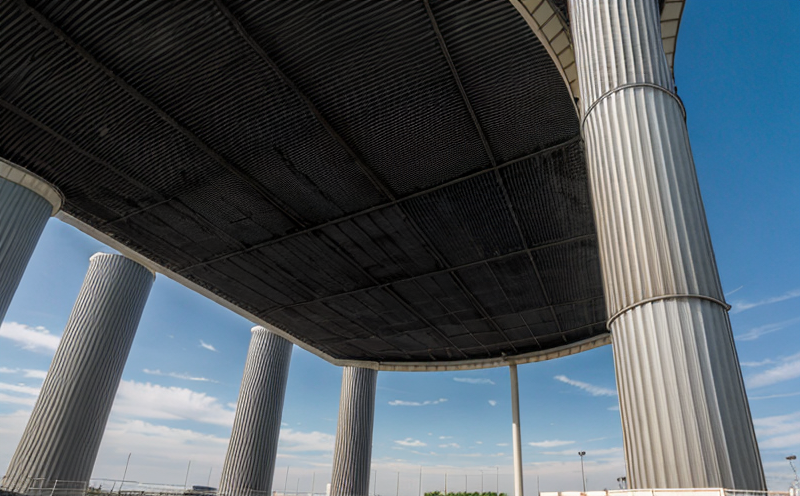Cooling tower inspection
The HVAC and ventilation systems are critical components of modern industrial facilities. Cooling towers play a pivotal role in maintaining optimal indoor air quality by dissipating heat from water used for cooling processes. Regular inspections are essential to ensure the efficiency, safety, and longevity of these systems. This service focuses on the detailed inspection of cooling towers to identify potential issues that could lead to downtime or increased maintenance costs.
The primary objective of a cooling tower inspection is to assess the condition of various components such as the water distribution system, fill, basin, drift eliminators, and overall structure. By adhering to established standards and guidelines, we ensure thoroughness and accuracy in our evaluations. This service is particularly important for facilities that rely heavily on continuous operation of their HVAC systems.
During an inspection, we employ a combination of visual inspections and non-destructive testing methods to assess the integrity of the cooling tower components. We use specialized tools like borescopes and thermal imaging cameras to examine areas that are inaccessible or difficult to reach during routine operations. Our team also collects water samples for microbiological analysis to ensure compliance with regulatory standards.
One of the key challenges in maintaining cooling towers is the prevention of biofilm formation, which can lead to Legionella outbreaks and other health hazards. By conducting regular inspections, we help facilities implement preventive maintenance strategies that reduce the risk of such incidents. Additionally, we provide recommendations for cleaning and disinfection procedures based on our findings.
Another critical aspect of cooling tower inspection is energy efficiency. We evaluate the performance of the cooling tower to identify any inefficiencies or areas where improvements can be made. This helps facilities optimize their energy consumption and reduce operational costs. Our expertise in this area ensures that we provide actionable insights that contribute to sustainable operations.
Our approach to cooling tower inspections is rooted in a comprehensive understanding of industry standards and best practices. We follow established guidelines such as ASHRAE 189.1, which provides recommendations for the design, construction, and operation of high-performance green buildings. By adhering to these standards, we ensure that our inspections are thorough and reliable.
The inspection process typically involves a series of steps to ensure accuracy and completeness. These include:
- Visual examination of all components
- Measurement of water quality parameters
- Microbiological testing for Legionella and other pathogens
- Evaluation of drift eliminators and their effectiveness
- Inspection of the water distribution system for blockages or damage
- Assessment of the cooling tower structure for signs of corrosion or structural issues
By following these steps, we provide a thorough assessment of the cooling tower's condition and recommend appropriate corrective actions. Our goal is to help facilities maintain optimal performance while minimizing downtime and costs associated with repairs.
Applied Standards
| Standard | Description |
|---|---|
| ASHRAE 189.1-2011 | Provides guidelines for the design, construction, and operation of high-performance green buildings. |
| EN 16777:2013 | Establishes requirements for water quality in industrial cooling systems. |
| ISO/TS 19485-2 | Defines the criteria for the production and testing of HVAC equipment. |
| ASTM E671 | Details procedures for sampling and analysis of water from cooling towers. |
Customer Impact and Satisfaction
- Reduction in operational downtime due to proactive identification of issues
- Increased safety by eliminating potential hazards associated with biofilm formation
- Sustained energy efficiency through regular performance evaluations
- Compliance with regulatory standards, ensuring legal and ethical operation
- Economic benefits from optimized maintenance schedules and cost-effective repairs
- Enhanced reputation for reliability and adherence to best practices
- Improved indoor air quality by addressing potential contamination sources
- Support for R&D initiatives through detailed performance data
International Acceptance and Recognition
The standards and practices we follow in cooling tower inspections are widely recognized and accepted across the globe. Our approach is based on internationally recognized guidelines such as ASHRAE 189.1, which ensures that our services meet global best practices. This recognition not only enhances our credibility but also facilitates seamless integration with international facilities.
Our expertise in cooling tower inspections has earned us a reputation for reliability and accuracy. We have successfully conducted inspections for numerous clients across various industries, including manufacturing, healthcare, and hospitality. Our commitment to excellence and adherence to global standards has made us a trusted partner in the HVAC sector.





